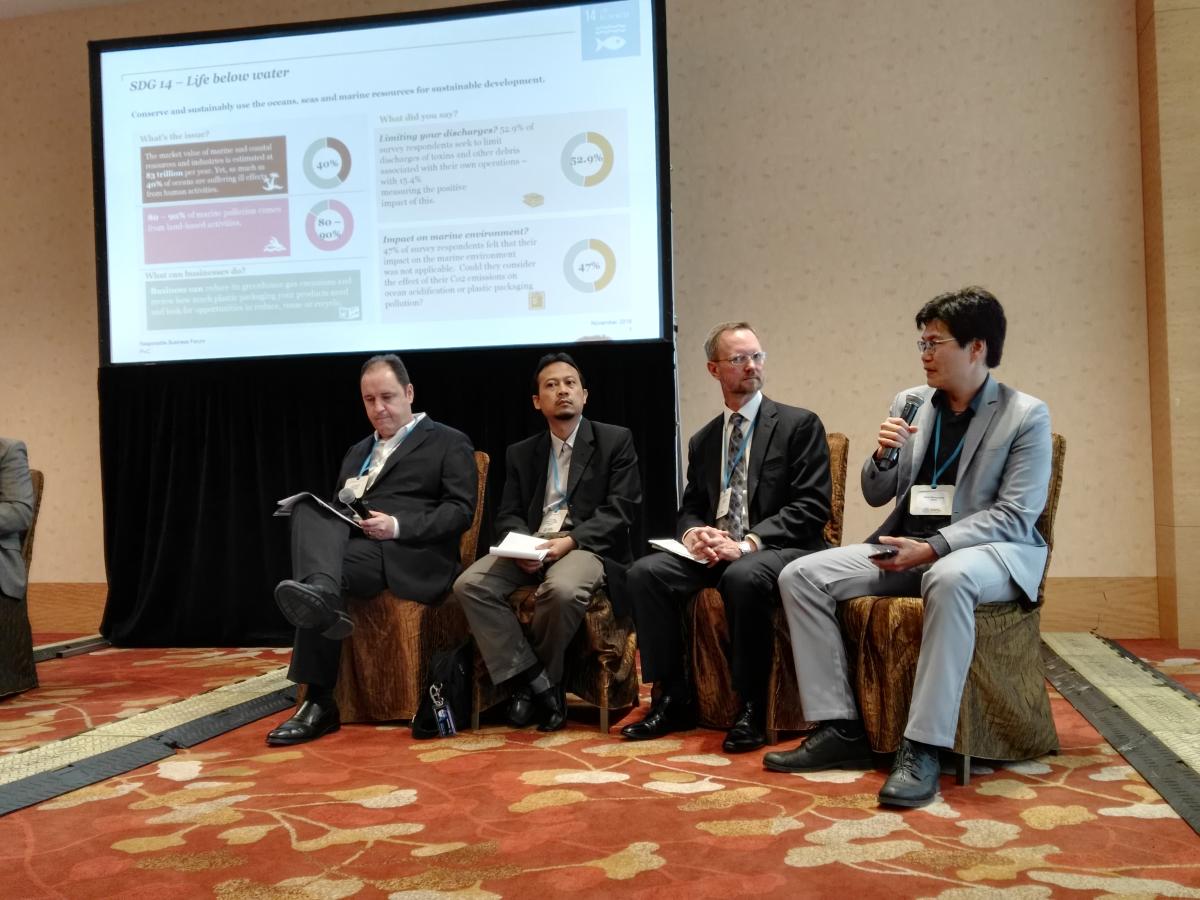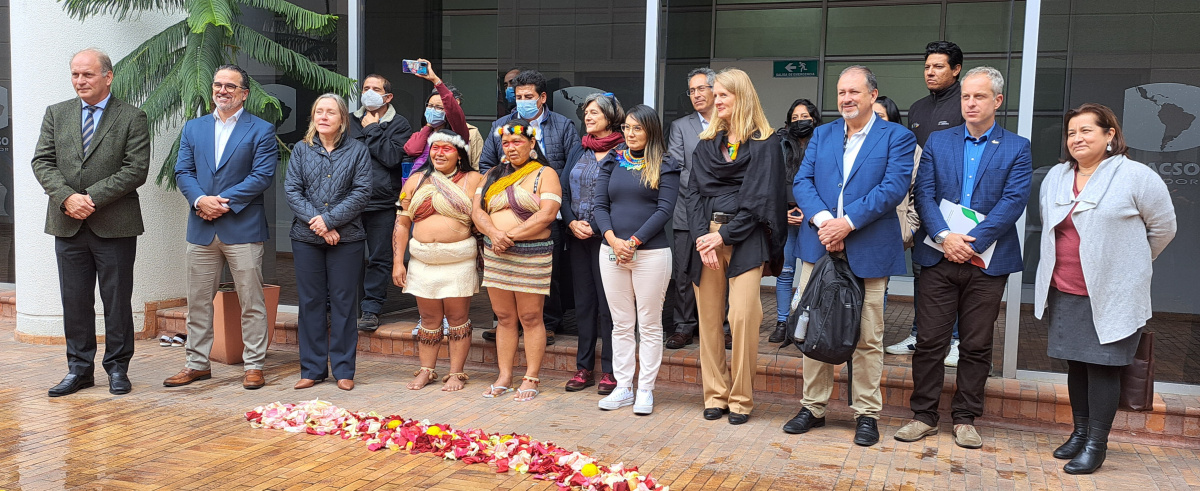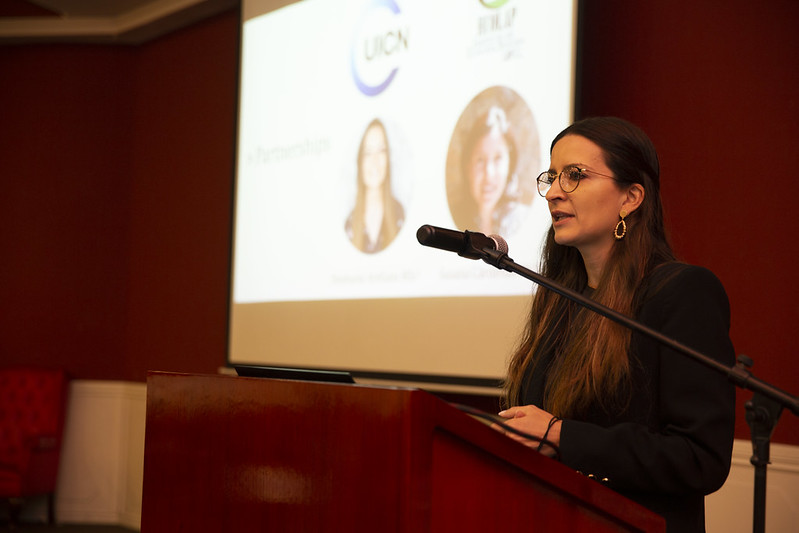The business community: Partners for a sustainable future
If there are three words that could sum up the spirit of the Responsible Business Forum (RBF) on Sustainable Development which took place in Singapore in November, they would be ‘Innovation’, ‘Collaboration’ and ‘Action’.

IUCN’s Petch Manopawitr and fellow panellists at the Forum’s SDG 14 ‘Life below water’ panel discussion.
Photo: © Ann Moey/IUCN
Held over two days, the Forum examined each of the 17 Sustainable Development Goals (SGDs), in depth, with case studies and insightful perspectives from governments, businesses, intergovernmental agencies and NGOs. The ultimate goal was to help companies better understand the new development agenda and the opportunities in supporting governments and civil society organisations to help achieve them.
As a keen believer that the private sector can play a key role in our quest for a sustainable future, I headed to the 5th edition of the Forum with high hopes: the event promised an attendance of over 700 participants, including a star-studded line-up of top ranking business professionals, policy-makers and NGO representatives from all around the world.
I wanted to hear first-hand from the business leaders themselves that their priorities have shifted – from being purely profit driven to making sustainability integral to running a successful business.
Launched by the United Nations, the SDGs aim to achieve extraordinary things in the next 15 years. This includes reducing greenhouse gases, ending poverty and increasing economic opportunities around the world.
Unlike its predecessor, the Millennium Development Goals (MDGs), the SDGs merge development priorities like environmental protection, gender equality, and inclusive growth with key business goals like revenue generation, resource productivity and risk management. This can be seen as an indication that the private sector has now been identified as a principle driver in achieving our global development goals. The SDGs also imply that the partnership between the public and private sector needs to evolve.
All over the world, businesses – to varying extents – rely on natural resources for countless production processes. As a result, many business activities have detrimental effects on our planet’s natural systems, as reflected in declining water supply, deforestation and climate change.
This is where IUCN’s Business and Biodiversity Programme comes in; working with the private sector to ensure that biodiversity and sustainability considerations become an integral part of their operations.
Declining resources have certainly put pressure on businesses to change the way in which they function. If we were to proceed with business as usual, our planet’s finite resources will eventually run out – at a rate much faster than we could ever expect.
This is a clear sign that that while businesses affect the health of the planet, they can also play a role in saving it – and offer innovative solutions for conservation in the process.
The key word here is innovation.
How can businesses create sustainable approaches and standards that safeguard healthy natural systems, upon which all life depends?
Business leaders will have to innovate: go back to the drawing board and think of ways to change the way they function. If for example, businesses want to contribute to environmental protection, they may need to think about how they can reduce their carbon dioxide emissions footprint. Can they invest in clean energy like solar power? Can they make their offices more energy efficient? These are all questions that business leaders have to ask themselves, and other key decision makers when it comes to the way they carry out their business activities.
One way they can be ahead of the curve, in terms of creating and innovating, is by forming greater international networks.
This brings me to my next point: collaboration.
SDG 16 explicitly talks about a ‘global partnership for development’, and has a target specifically related to multi-stakeholder collaboration. It has been widely recognised that the government alone cannot move sustainable development forward: the private sector needs to step up and play an increasingly significant role.
At the Forum, keynote speakers echoed this point by emphasising that all sectors of society need to converge, leverage on one another’s resources and expertise, and develop joint strategies in order to move closer to the sustainable develop goals.
Here in Asia for example, Marriott Hotels & Resorts established a partnership with Mangroves for the Future (MFF), IUCN’s regional coastal ecosystem initiative, to protect the environment and support Thailand’s local communities through mangrove restoration, the use of sustainable seafood sources and local procurement practices. In short, Marriot wanted to conduct its business in a more sustainable and socially responsible manner, and IUCN – whose mission is to influence, encourage and assist societies in ensuring that any use of natural resources is equitable and ecologically sustainable – knew how it could help Marriot achieve its goals.
Additionally, the partnership contributes to a much bigger conservation priority – protecting our oceans.
As my colleague Petch Manopawitr, who was part of the Forum’s SDG 14 ‘Life below water’ panel discussion, has said, “The Ocean is our lifeblood. It is fundamental to sustaining life on Earth; is a major carbon sink, and produces half the oxygen we breathe.”
Another way in which we can collaborate is to exchange lessons learned in order to scale up frameworks that already exist, so as to be more effective on a much larger scale. For MFF, the programme hopes to scale up the lessons learned from its partnership with Marriott to assist other companies in the tourism and fisheries sector.
Finally, we need to take action. Because what would be the point of all that talk and discussion if nothing is being executed on the ground?
Companies can drive change through their own actions. But to strengthen their positive contributions – as mentioned earlier – there must be on-going engagement with key stakeholders.
In terms of environmental protection, the private sector can work with partners like conservation organisations to determine what the best course of action may be. In India for example, IUCN worked with TATA Steel to develop a biodiversity management plan for several mining sites. The company has since adopted policies on the ground that minimise impacts on biodiversity.
Besides opening new prospects for businesses to manoeuvre in the right direction to achieve the development goals, the SDGs also offer a unique opportunity for development actors to be strategic about their collaboration with the private sector and to be realistic in their expectations of the private sector.
If done properly, businesses can clearly become real agents for change, while also being profitable and securing their long-term viability.
Needless to say, the Forum met my expectations. By setting itself up as an enclave of common understanding towards a sustainable and equitable future, the event helped all sectors of society, in particular, the business community, move one step closer to making the SDGs a reality and not just a dream.
This blog is contributed by Ann Moey, Head of Communications, IUCN Asia Regional Office.
Mangroves for the Future (MFF) is a partnership-based regional initiative which promotes investment in coastal ecosystem conservation for sustainable development. MFF focuses on the role that healthy, well-managed coastal ecosystems play in building the resilience of ecosystem-dependent coastal communities in Bangladesh, Cambodia, India, Indonesia, Maldives, Myanmar, Pakistan, Seychelles, Sri Lanka, Thailand and Viet Nam. The initiative uses mangroves as a flagship ecosystem, but MFF is inclusive of all types of coastal ecosystem, such as coral reefs, estuaries, lagoons, sandy beaches, sea grasses and wetlands. MFF is co-chaired by IUCN and UNDP, and is funded by Danida, Norad, and Sida and the Royal Norwegian Embassy in Thailand.



